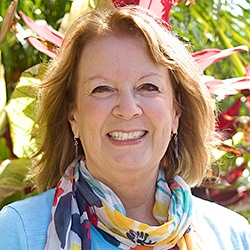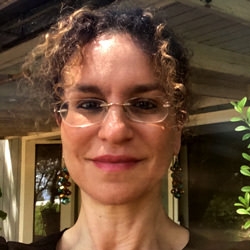
Search Results: guilt
-
NVC practice is based on several key assumptions and intentions. When we live based on these assumptions and intentions, self-connection and connection with others become increasingly possible and easy, helping us contribute to a world where everyone’s needs are attended to peacefully.
-
This gentle, healing telecourse recording will assist you in unearthing feelings and issues that have become tangled up with loss, enabling you to face whatever is blocking your grief.
-
Trainer Tip: Every single time you say or do something, even when you experience pain or regret, you are trying to meet a need. Forgiveness begins when we acknowledge the needs we were trying to meet in the situation.
-
Trainer tip: NVC focuses on shared human values and needs, and encourages the use of language that increases good will -- plus avoidance of language that contributes to resentment or lowered self-esteem. It emphasizes taking personal responsibility for choices and improving the quality of relationships as a primary goal. For today, focus on making observations without moralistic judgment in at least two of your interactions.
-
- Celebrate and nurture your relationship to the Earth — and each other!
- Explore your connections to family, partner, work, nature, self and more
- Discover new ways to grow in community and work together to make this world a better place
- Engage and immerse yourself in NVC while making new friends!
-
- Learn concrete tools for engaging with others as you embrace individual and collective liberation
- Find your own source of choice even in the face of challenges
- Release the constriction of scarcity
- Find an empowered option to respond to what is happening in our world
- Open the door to the possibility of thriving rather than merely surviving
-
If we’re selfish, all we care about is our own needs. If we’re selfless, our needs don’t enter the picture; others needs are the focus. But what if serving others meets our needs? What if being only selfish ultimately results in our needs being unmet? Do you find yourself bouncing between being a selfless doormat and then resenting it, and beating yourself up for being “selfish”? Instead, care about others’ needs AND your needs.
-
Trainer Tip: Notice when you're tempted to wield physical, emotional, and intellectual power to get your children to do what you want. This coercion or force may bring short term ease, but long term it can be counterproductive. Ask yourself “What do I want my child to do?” and “What do I want my child’s reasons for doing it to be?”. Then consider ways to help them connect to their intrinsic motivation for doing it.
-
Observation is the awareness of our sensory perceptions and thoughts, separate from evaluations and judgments. Feeling involves bodily sensations and emotions, distinct from "faux feelings" that mix thought and emotion. Needs encompass universal human requirements for survival and wellness, while thoughts and evaluations express needs. Requests are rooted in connection and invite true willingness, rather than demanding compliance.
-
Join Aya Caspi, a Certified NVC Trainer, as she delves into the difficult topic of parenting, childhood trauma, and social status. She discusses the generational impact of being labeled by society as "less than" or subservient. The wounds of childhood trauma can be healed so they no longer are a means of control by a dominant culture.
-
Observation is the awareness of our sensory perceptions and thoughts, separate from evaluations and judgments. Feeling involves bodily sensations and emotions, distinct from "faux feelings" that mix thought and emotion. Needs encompass universal human requirements for survival and wellness, while thoughts and evaluations express needs. Requests are rooted in connection and invite true willingness, rather than demanding compliance.
-
- Discover the healing magic that comes from welcoming pain rather than avoiding it
- Learn how to navigate ‘healing dialogues’ when hurt or pain is present
- Increase your empathy/honesty skills and your ability to navigate painful conversations
- Embrace pain as a precious life-guiding force that teaches us how to be together!
-
-
Listen to this telecourse recording with CNVC Certified Trainer, Alan Seid, to explore what is meant by social change in the context of NVC, and learn how Nonviolent Communication can be a powerful ally for creating social change.
-
In the "obnoxious stage" we care for our needs in a way that doesn't respect others' needs. In the "emotional liberation" stage we fully care for others' needs as much as our own—while being free of fear, guilt, shame, or obligation. Often NVC training teaches us how to achieve the latter stage without the former. For greater compassion we can be more rigorous in how we talk about “responsibility", impacts and interdependence.
-
One NVC principle is "stimulus vs cause" - one may be the stimulus but never the cause of another's feelings. When we're upset this principle can help us express pain without blame. However, when others are upset it's easy to slip into blaming them using this principle. Instead, we can hear their pain with care and heartfelt mourning - without guilt nor defensiveness, and whether or not we agree. All this is important if we're sincerely applying compassion. Read on for more.
-
Marriage can be seen as a limit on freedom. Ideas of compromise collude with this view. Instead, notice when your "yes" to your partner is laden with obligation, duty, guilt, fear, or an attempt to win love or approval, and how it's not a truly free "yes". True freedom is different from compulsion, and doesn't conflict with other needs. When have you experienced true freedom? What conditions support your access to freedom?
-
When we have privilege, we can have access to resources resulting from legal or social norms related to membership in a group -- independent of any (in)action, awareness of the disparity, the potential benefits to us, or the costs to others. Unhelpful ways of engaging with privilege are: denial/invisibility, guilt/shame, defensiveness, and entitlement. Helpful ways of engaging are: owning privilege, learning about privilege, opening to feedback, and stewarding privilege for benefit of all. To be helpful we need to engage with necessary (rather than unnecessary) discomfort.



















